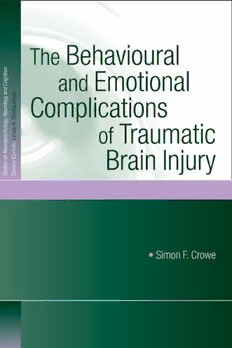
The Behavioural and Emotional Complications of Traumatic Brain Injury PDF
298 Pages·2008·3.018 MB·English
Most books are stored in the elastic cloud where traffic is expensive. For this reason, we have a limit on daily download.
Preview The Behavioural and Emotional Complications of Traumatic Brain Injury
Description:
It is difficult to imagine what it must be like for someone following the personal crisis and catastrophe that ensues as a result of a serious traumatic brain injury (TBI). The individual is confronted with a huge range of alterations in his or her normal functioning, operating at the biological, psychological and social levels. All of these changes are also occurring to an individual who has just had a near-death experience, culminating not too surprisingly in the reflections "Who am I?" and "Why am I here?" As a result, these individuals can develop a wide range of behavioural, emotional, and psychiatric conditions following the injury, including depression, bipolar disorder, secondary mania, psychotic states, posttraumatic stress disorder, obsessive-compulsive disorder, phobic disorders, and generalized anxiety disorders, to name a few. In addition, these individuals can also be subject to a number of neuropsychiatric syndromes, including disorders of drive, disorders of impulse control, and disturbance of neurovegetative functioning. This book presents the current state of our knowledge of the behavioural and emotional effects that can occur as sequelae of TBI, and addresses issues associated with their differential diagnosis and the neurobiological mechanisms by which these might occur. The book will prove an excellent resource not only for clinicians who practice as psychiatrists, behavioural neurologists, clinical neuropsychologists and clinical psychologists, but also for psychologists in advanced training and for anyone who is involved in caring for or working with individuals with TBI.
See more
The list of books you might like
Most books are stored in the elastic cloud where traffic is expensive. For this reason, we have a limit on daily download.
